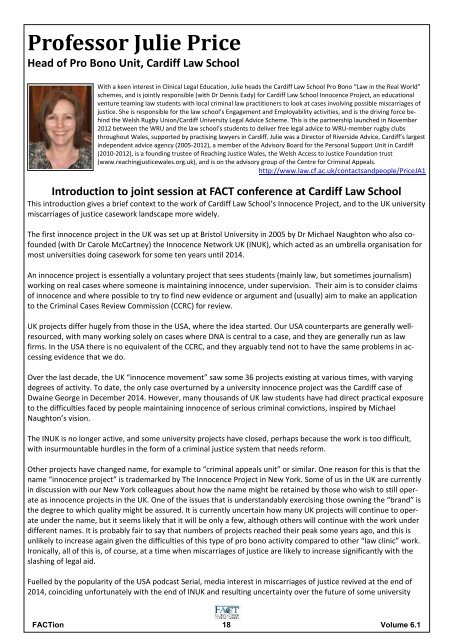FACTion-6.1-web-version
FACTion-6.1-web-version
FACTion-6.1-web-version
You also want an ePaper? Increase the reach of your titles
YUMPU automatically turns print PDFs into web optimized ePapers that Google loves.
Professor Julie PriceHead of Pro Bono Unit, Cardiff Law SchoolWith a keen interest in Clinical Legal Education, Julie heads the Cardiff Law School Pro Bono “Law in the Real World”schemes, and is jointly responsible (with Dr Dennis Eady) for Cardiff Law School Innocence Project, an educationalventure teaming law students with local criminal law practitioners to look at cases involving possible miscarriages ofjustice. She is responsible for the law school’s Engagement and Employability activities, and is the driving force behindthe Welsh Rugby Union/Cardiff University Legal Advice Scheme. This is the partnership launched in November2012 between the WRU and the law school’s students to deliver free legal advice to WRU-member rugby clubsthroughout Wales, supported by practising lawyers in Cardiff. Julie was a Director of Riverside Advice, Cardiff’s largestindependent advice agency (2005-2012), a member of the Advisory Board for the Personal Support Unit in Cardiff(2010-2012), is a founding trustee of Reaching Justice Wales, the Welsh Access to Justice Foundation trust(www.reachingjusticewales.org.uk), and is on the advisory group of the Centre for Criminal Appeals.http://www.law.cf.ac.uk/contactsandpeople/PriceJA1Introduction to joint session at FACT conference at Cardiff Law SchoolThis introduction gives a brief context to the work of Cardiff Law School’s Innocence Project, and to the UK universitymiscarriages of justice casework landscape more widely.The first innocence project in the UK was set up at Bristol University in 2005 by Dr Michael Naughton who also cofounded(with Dr Carole McCartney) the Innocence Network UK (INUK), which acted as an umbrella organisation formost universities doing casework for some ten years until 2014.An innocence project is essentially a voluntary project that sees students (mainly law, but sometimes journalism)working on real cases where someone is maintaining innocence, under supervision. Their aim is to consider claimsof innocence and where possible to try to find new evidence or argument and (usually) aim to make an applicationto the Criminal Cases Review Commission (CCRC) for review.UK projects differ hugely from those in the USA, where the idea started. Our USA counterparts are generally wellresourced,with many working solely on cases where DNA is central to a case, and they are generally run as lawfirms. In the USA there is no equivalent of the CCRC, and they arguably tend not to have the same problems in accessingevidence that we do.Over the last decade, the UK “innocence movement” saw some 36 projects existing at various times, with varyingdegrees of activity. To date, the only case overturned by a university innocence project was the Cardiff case ofDwaine George in December 2014. However, many thousands of UK law students have had direct practical exposureto the difficulties faced by people maintaining innocence of serious criminal convictions, inspired by MichaelNaughton’s vision.The INUK is no longer active, and some university projects have closed, perhaps because the work is too difficult,with insurmountable hurdles in the form of a criminal justice system that needs reform.Other projects have changed name, for example to “criminal appeals unit” or similar. One reason for this is that thename “innocence project” is trademarked by The Innocence Project in New York. Some of us in the UK are currentlyin discussion with our New York colleagues about how the name might be retained by those who wish to still operateas innocence projects in the UK. One of the issues that is understandably exercising those owning the “brand” isthe degree to which quality might be assured. It is currently uncertain how many UK projects will continue to operateunder the name, but it seems likely that it will be only a few, although others will continue with the work underdifferent names. It is probably fair to say that numbers of projects reached their peak some years ago, and this isunlikely to increase again given the difficulties of this type of pro bono activity compared to other “law clinic” work.Ironically, all of this is, of course, at a time when miscarriages of justice are likely to increase significantly with theslashing of legal aid.Fuelled by the popularity of the USA podcast Serial, media interest in miscarriages of justice revived at the end of2014, coinciding unfortunately with the end of INUK and resulting uncertainty over the future of some university<strong>FACTion</strong> 18 Volume <strong>6.1</strong>


